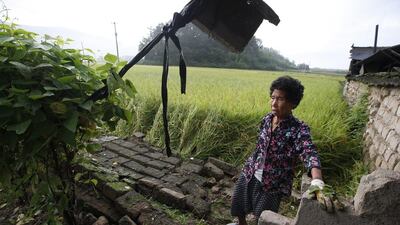Seoul // South Korea was clearing up on Tuesday after being struck by its most powerful earthquake since records began.
The 5.4-magnitude quake late on Monday sent people scurrying from buildings, unused to phenomena that regularly shake neighbouring Japan.
Seismologists said the quake was a natural geological event and unrelated to the “artificial earthquake” caused last week when North Korea carried out an underground nuclear test.
There were no reported deaths, but six people suffered minor injuries after being hit by falling objects, the ministry of public safety and Security reported.
South Korea’s lively social media was flooded with images of shattered shopfront windows and people fleeing apartments in panic, some with children in their arms.
Some spent the night in shelters or in their cars.
Kakaotalk, the country’s largest mobile app, which is used by 40 million people, partially went down as users rushed to exchange messages after the quake.
Reactors at four nuclear power plants were shut down for safety inspections, and were expected to remain off line for several days, but there were no indications of any damage.
Korea Hydro and Nuclear Power, which operates the country’s 24 nuclear plants, said it had halted operations at four sites “on the off-chance” that they might have suffered damage.
“All our plants were designed to sustain quakes of up to 6.5 magnitude”, a spokesman said.
The US Geological Survey said the country had been hit by two quakes, the first of which had a magnitude of 4.9. It was followed an hour later by the more powerful tremor.
Korean seismologists, who put the magnitude of the second quake at 5.8, said it was the most powerful to hit since records began in 1978.
* AFP

